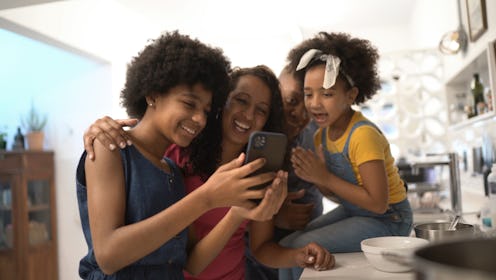Life
Why We Mix Up The Names Of People We're Close With

If you have siblings, you’ve surely had the experience of your mother calling you all of their names — and maybe even the dog’s — before landing on yours, and you’ve probably done something similar with friends. A study out of Duke University reveals why we confuse the names of loved ones — and it isn’t because we can’t tell them apart or aren’t paying attention. Instead, it has to do with how we organize people in our minds. We accidentally replace some people’s names with other’s because we think of them as part of the same “categories.” So when you call one of your best friends by the name of another best friend, it’s because you think of them both as close loved ones. And when your mom accidentally calls you by your brother’s name, it’s because she categorizes you both as her children. It’s really kind of sweet, when you think about it.
For the study, published in April in the journal Memory and Cognition, researchers conducted five surveys of more than 1,700 participants. Calling loved ones by the wrong names, which the study refers to as “misnaming,” proved to be a common thing among the survey subjects, who came from a variety of age brackets. Aging didn’t seem to be a factor in how frequently people make these kinds of naming mistakes.
The researchers found that misnaming seems to follow certain patterns. When someone calls a loved one by a wrong name, they don’t haphazardly choose a name out of the ether to replace the real one. Instead, they choose names that fit within the same mental group — family members’ names go to family members, and friends’ names go to other friends, for example. “It’s a cognitive mistake we make, which reveals something about who we consider to be in our group,” said David Rubin, one of the study’s authors and professor of psychology and neuroscience at Duke. “It’s not just random.”
The researchers found that, although similarity in appearance didn’t affect how often people misname their loved ones, similarities in the sounds of their names did. People tend to mix up names that have similar beginnings and endings (Like “Michael” and “Mitchell”) or that have similar vowel sounds (like “John” and “Bob”). (This explains why my mom has been accidentally calling me by my aunt’s name — “Barbara” — instead of my name — “Lara” — for my entire life.)
If, like me, you’ve ever had one of your parents refer to you by the name of the family dog, you won’t be surprised to learn that misnaming extends beyond human family members, and that people often give their human loved ones the names of family pets. The surveys showed that in most cases, this misnaming between human and animal occurred when people gave the pet’s name to a family member, rather than a friend, suggesting that the pet lives in the mental category assigned to family. (Only you can decide if this evidence of your pet’s beloved role in the family is enough to offset the indignity of being called “Mr. Fluffington.”)
Furthermore, the researchers found that, when people use a pet’s name for a child or other family member, that pet was usually a dog. Lead author Samantha Deffler, a Duke Ph.D. student, explained in a statement, “I’ll preface this by saying I have cats and I love them. But our study does seem to add to evidence about the special relationship between people and dogs.” She added, “Also, dogs will respond to their names much more than cats, so those names are used more often. Perhaps because of that, the dog’s name seems to become more integrated with people’s conceptions of their families.”
Images: FG Trade/E+/Getty Images; Giphy